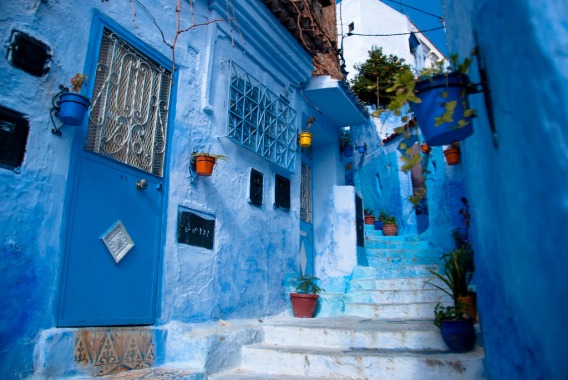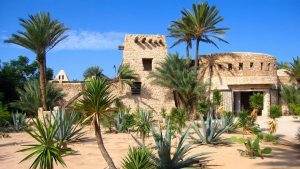Tunisia : Safety by City
Warnings & Dangers in Tunisia

OVERALL RISK : MEDIUM
Tunisia is generally a safe country, but there are a lot of petty thefts and pickpockets. Always keep an eye on your belongings and your surroundings. Do not trust those who ask or offer you help. Keep relevant documents and expensive devices in the hotel safe.

TRANSPORT & TAXIS RISK : MEDIUM
Public transport is not safe enough in Tunisia due to numerous pickpockets in it. Tourists are advised to use a rented car or take a taxi. In a taxi, make sure the driver turns on the taximeter or negotiate the fare in advance.

PICKPOCKETS RISK : HIGH
Pickpockets are the biggest problem in Tunisia. You need to constantly monitor your belongings. Carry your belongings in your anti-theft backpack, as pickpockets can discreetly take out your precious items. Do not carry a lot of cash with you, keep the original documents in the hotel safe. Do not trust those who ask or offer you help - they are usually hidden scammers.

NATURAL DISASTERS RISK : MEDIUM
Some of the most common natural disasters that have affected Tunisia over the years have been floods, landslides, and earthquakes.

MUGGING RISK : MEDIUM
The risk of armed severe attacks and kidnapping in Tunisia is not very high. However, in any case, you should be on the alert, avoid walking in remote parts of the city, do not walk late at night, especially on the beaches.

TERRORISM RISK : LOW
The risk of terrorism in Tunisia is not very high. However, selective attacks can occur. Avoid political and religious demonstrations.

SCAMS RISK : HIGH
Most often, fraud in Tunisia is associated with overpricing. Local merchants may try to sell you knick-knacks and souvenirs at overpriced prices. Also, do not catch a taxi on the street - the driver can significantly increase the fare. Better to use licensed taxi services.

WOMEN TRAVELERS RISK : MEDIUM
Women traveling alone need to take extra care when traveling to Tunisia. Dress modestly, do not walk alone late at night, do not draw attention to yourself with loud conversations and behavior.
How Safe Is Tunisia for Tourists?
Pickpocketing and petty theft are common throughout the country.
Therefore, you need to monitor your belongings and wallets continually.
Especially in bazaars.
You may not even notice when the pickpocket takes out your wallet.
Do not carry a lot of cash with you, but keep the original documents in the hotel safe.
Please be aware that the export of Tunisian currency is prohibited, and searches of wallets and purses may take place at Tunis airport.
When it is time to pay your bill at a Tunisian cafe/restaurant, get a complete copy of the invoice before giving the money.
Make sure that you are given the correct change.
Store owners will aggressively try to convince you to look at what products they sell in their stores and kiosks.
If you don’t want to come in, be polite but firm and leave.
The locals are quite friendly, especially towards tourists. It is best not to discuss political or religious topics with local people. This is a rather sensitive topic and can lead to conflicts.
Remember that Tunisia is a Muslim country, and it is essential to adhere to the dress code here. You can normally dress on the beach, but it is necessary to wear more closed clothing in town and on hotel grounds, especially for women.
Do I Need a Visa to Visit Tunisia?
Visitors to Tunisia must obtain a visa from one of the Tunisian diplomatic missions unless they come from one of the visa-exempt countries. A valid passport is a must.
Which Currency Is Used in Tunisia?
The dinar is the currency of Tunisia. It is subdivided into 1000 milim or millimes. The abbreviation DT is often used in Tunisia, although writing “dinar” after the amount is also acceptable.
How's the Weather like in Tunisia?
The best times to visit Tunisia for ideal weather are mid-March to mid-June or October to December. The average temperatures in Tunis vary greatly and the weather feels nice most of the year, excluding some hot weeks in the summer, with a low chance of precipitation most of the year.
What Do I Need to Know about Airports in Tunisia?
Tunis–Carthage Airport is the international airport of Tunis, the capital of Tunisia. It serves as the home base for Tunisair, Tunisair Express, Nouvelair Tunisia, and Tunisavia. The airport is named for the historic city of Carthage, located just east of the airport.
Should I Get Travel Insurance for My Travels?
Just like anywhere else, the travel insurance policy is a must when visiting a foreign country. Make sure you got it before starting your journey, the customs officer may ask for it.
What Are Some Things to Do in Tunisia?
In Tunisia, the country’s capital of the same name, it is worth visiting the Bardo Archaeological Museum, which displays Roman mosaics and works of Islamic art. In the medina (old city), tourists are attracted by the huge mosque of al-Zaytun and the colorful bazaar. In the north-east of the country are the ruins of the ancient city of Carthage, including the Baths of Antoninus, and the National Museum of Carthage, where you can see many archaeological finds.
Is the Water in Tunisia Safe to Drink?
Tunisia has achieved the highest access rates to water supply and sanitation services among the Middle East and North Africa. But tap water isn’t drinkable here.
Is Uber Safe in Tunisia?
There is no Uber taxi service in Tunisia. But you can use any other taxi service in this country.

